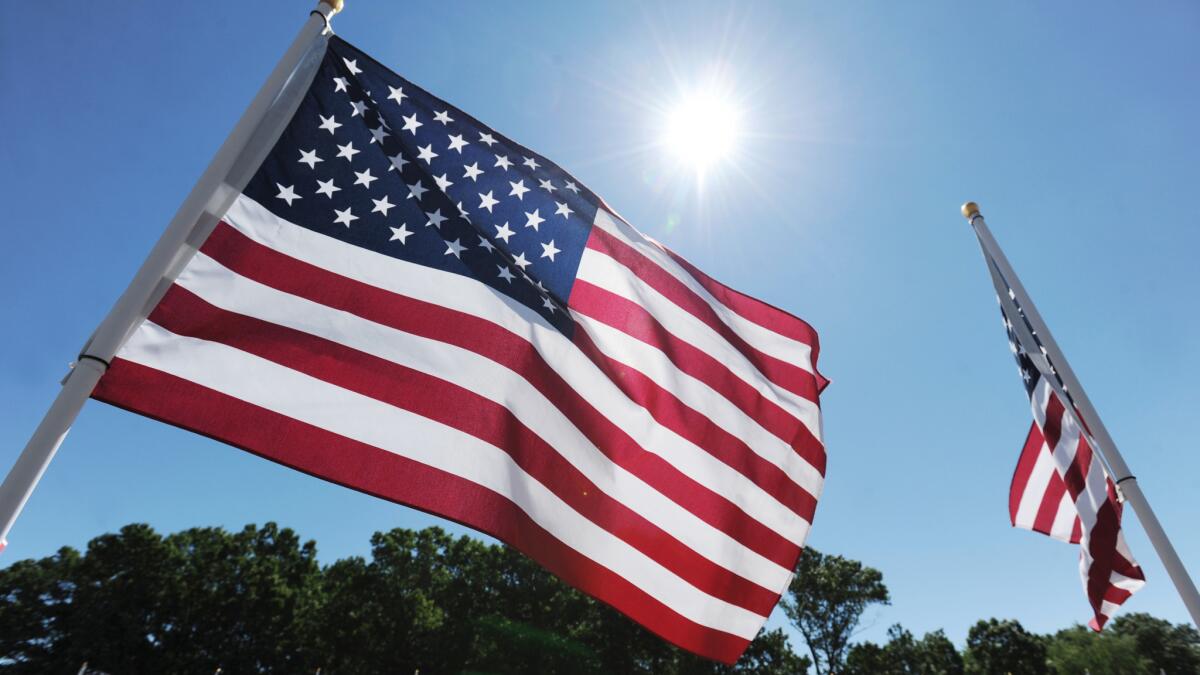Op-Ed: Flags are great for holiday celebration, but hyper-patriotism is un-American

- Share via
In many parts of the country, American flags fly all year, not just on government buildings but on front porches and trucks. Where I live, they have a season. They come out in late June, just in time for Independence Day. They are clean and look freshly unfolded, creased where they were divided in half, then in quarters, so they could fit high on the shelf in the garage. When the flags come out, we are proclaiming a holiday, not a way of life.
I come from flag-ambivalent America. My neighborhood is peopled by gays and Jews, professors and social workers, and Catholics of the Dorothy Day persuasion. Yoga practitioners and yoga teachers. Vegetarians. Bicycling enthusiasts.
We love the Fourth of July, with its long weekend, its parades, its backyard barbecues (veggie burgers available). It wouldn’t be Independence Day without flag bunting on floats, flags lining our Main Streets, flags adorning houses. But we aren’t much for patriotic symbolism the rest of the year. For us, it’s an article of faith that crude patriotism quickly turns on the underdog, the minority. We know how the flag is used to impose loyalty tests, which we find un-American.
We remember how, in 1988, presidential candidate George H.W. Bush ridiculed Michael Dukakis for opposing mandatory recitation of the Pledge of Allegiance in public schools, a position deeply consonant with American freedom of conscience. The following year, the Supreme Court enraged flag-obsessed patriots when it ruled in Texas vs. Johnson that statutes protecting the American flag from desecration were unconstitutional. Flags could now be burned with impunity!
Except that flag-burning had never really been a thing. I’ve had lefty-pinko-subversive friends all my life, many with the awful music collections to prove it, and I’ve never seen a flag burned. But the fear of lefty-pinko-subversive flag-burners was useful political theater, and from 1995 to 2005 Republicans in Congress repeatedly proposed an amendment to allow laws prohibiting flag desecration. The point was never to pass the amendment, but to force liberals to vote against it, so that they could be branded traitors, like Dukakis.
We know how the flag is used to impose loyalty tests, which we find un-American.
The Senate last voted on the amendment in 2006. The next year, a young senator from Illinois running a quixotic campaign for president happened not to wear a flag pin on his lapel. And the media inquired as to why.
“The truth is that right after 9/11, I had a pin,” Barack Obama told a local television reporter in Iowa on Oct. 3, 2007. But he soon became concerned that, for many people, the pin substituted for deeper thought. “I decided I won’t wear that pin on my chest. Instead I’m going to tell the American people what I believe will make this country great and hopefully that will be a testimony to my patriotism.”
Although Obama, a shrewd politician, eventually took to wearing lapel jewelry, some conservatives never forgot Obama’s treachery. “Romney’s flag pin is much larger than Obama’s flag pin,” noted a writer for the National Review’s blog, commenting on a presidential debate in 2012.
We need symbols, but symbolism too often replaces, rather than complements, thoughtfulness. The great Israeli scholar Yeshayahu Leibowitz once wrote that most Israeli Jews “have no content for their Judaism other than a piece of colored rag attached to the end of a pole and a military uniform.” Leibowitz’s rag on a pole is often reworded, in a wonderful Yinglish (that’s Yiddish/English) saying, as “a schmatte on a stick” — a phrase that really gets at the absurdity of venerating a piece of fabric.
The Judeo-Christian tradition has a name for that heresy: idol worship. Like many houses of worship, my synagogue hangs an American flag in the front (and an Israeli one, too). I wish we wouldn’t. If I face the Torah scroll, I’m confronted by those two schmattes on sticks. Yet the Torah is the opposite of a crude symbol. Like other great books — like the U.S. Constitution, for that matter — it invites us not to simplify but to enlarge our thinking. It invites, indeed has been improved by, interpretation.
On the Fourth of July, flags make me think about a war fought for democracy, a subsequent struggle to make that democracy better and more inclusive, and, most immediately, a holiday, a day off, so a free people can enjoy some extra leisure. But the rest of the year? Flags make me uneasy. I know their owners are checking out my lapel, and probably my front porch. And I know what they’re not seeing.
Mark Oppenheimer, a contributing writer to Opinion, is the author of three books, most recently “Wisenheimer: A Childhood Subject to Debate.” He is the host of the podcast Unorthodox.
Follow the Opinion section on Twitter @latimesopinion or Facebook
MORE FROM OPINION
Stop worrying about GMOs; it’s that organic granola bar that could make you sick
How vegetarians, gluten-frees, grain-frees and other L.A. food tribes ruined my BBQ tradition
A cure for the common opinion
Get thought-provoking perspectives with our weekly newsletter.
You may occasionally receive promotional content from the Los Angeles Times.






